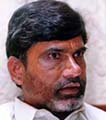Chandrababu Naidu remains an enigma
 During last year's general election, when Prannoy Roy asked Nara Chandrababu Naidu on the India Polls programme if he would support the National Front, a peeved Naidu said, "What Front, there is no National Front." So, asked Roy, are you planning to form a front of your own? In the two minutes that Naidu took to reply, he had not only formulated his answer, but his entire strategy for the coming days. "Yes," he said, "what we need is a fourth front. A loose coalition of regional parties that will take into account regional aspirations." And so, the United Front was born.
During last year's general election, when Prannoy Roy asked Nara Chandrababu Naidu on the India Polls programme if he would support the National Front, a peeved Naidu said, "What Front, there is no National Front." So, asked Roy, are you planning to form a front of your own? In the two minutes that Naidu took to reply, he had not only formulated his answer, but his entire strategy for the coming days. "Yes," he said, "what we need is a fourth front. A loose coalition of regional parties that will take into account regional aspirations." And so, the United Front was born.
Naidu had been peeved with the Janata Dal for siding against him in his fight with father-in-law N T Rama Rao, which led to Rao's ouster and Naidu's installation as chief minister in August 1995. Now, with 16 MPs, Naidu was not going to go begging bowl in hand to the same Janata Dal. He waited for the impact of his statement on Prannoy Roy's programme to set in and for the Dal leaders to come to him.
They came. And for the next few days, while others talked policy, it was Naidu who almost single-handedly --coaxing, cajoling, bribing, threatening -- managed the logistics of bringing 13 different parties together.
That, in essence, is what Naidu is about. In many ways a brilliant college union leader -- adept at getting posters organised, mobilising crowds, bringing people together and forcing a truce -- he was now dealing in very high stakes.
But, more importantly, a man who prefers to deal from a position of strength or not at all.
Few people remember -- and Chandrababu Naidu would be the last to remind them -- that he was originally a Congressman. Starting off as a Congress activist in Chittoor district in the seventies, he soon rose to become minister for cinematography in T Anjaiah's Cabinet and not long after married NTR's third daughter, Bhuvaneswari.
Ironically, he really grew to a position of strength between 1989 and 1994 when the party was in the Opposition. While NTR was moping in his house, Naidu went about reorganising the party that ultimately
led to the TDP's amazing victory in 1994 with 222 of the 294 assembly seats.
But by this time, Rama Rao had already married Lakshmi Sivaparvati, a woman every bit as ambitious as Chandrababu Naidu. Seeing all his efforts and years of patient waiting going down the drain, Naidu engineered the coup in August 1995 that left NTR with less than a third of the party's MLAs.
Many people then believed Naidu had overreached himself. Specially in the wake of Rama Rao's death next January when Naidu was stoned at NTR's house by grieving fans. But that problem was also taken care of when, in the general election, he wiped out Lakshmi Sivaparvati's faction of the TDP and left the Congress trailing behind.
And to complete his hold on the party, on March 30, Chandrababu Naidu got himself re-elected party president for the second term, having completely sidelined NTR's sons who had taken part in the coup in the hope of stepping into their father's shoes. And minutes before news reached Hyderabad and Sitaram Kesri had withdrawn support to the Deve Gowda government, Naidu had wiped out the last of the NTR legacy -- changing the party's foundation day from NTR's birthday on 28 May to 29 March.
But a look a the man's entire life still gives little clue to his character. Politically, he is rarely known to utter a wrong word in public. He managed to reverse the one promise on which the TDP came to power -- prohibition -- without inflaming the kind of anger it would otherwise have generated. He has being accused of running an extremely corrupt administration, but remains unrattled. Ideologically, he is neutral and cannot be described as being leftist, rightist, left-of-centre or saffron-tinged. Because by being nothing, he can be all things to all people.
In the parameters of National Front/United Front politics, he had always ridiculed NTR's exaggerated ideas about his role in national politics. Naidu believes the TDP's strength lies in the state though he is not averse to flexing his muscles at the Centre when he can -- the present turbulent times, for instance.
And personally? He is known to be efficient, but is he nice? He can think on his feet, but does he -- feel deeply about anything? He can be an ominous foe, but is he a good friend? There is something
in his slightly wide-eyed but blank look that stops people from probing too deep.
Kind courtesy: Sunday magazine
|



